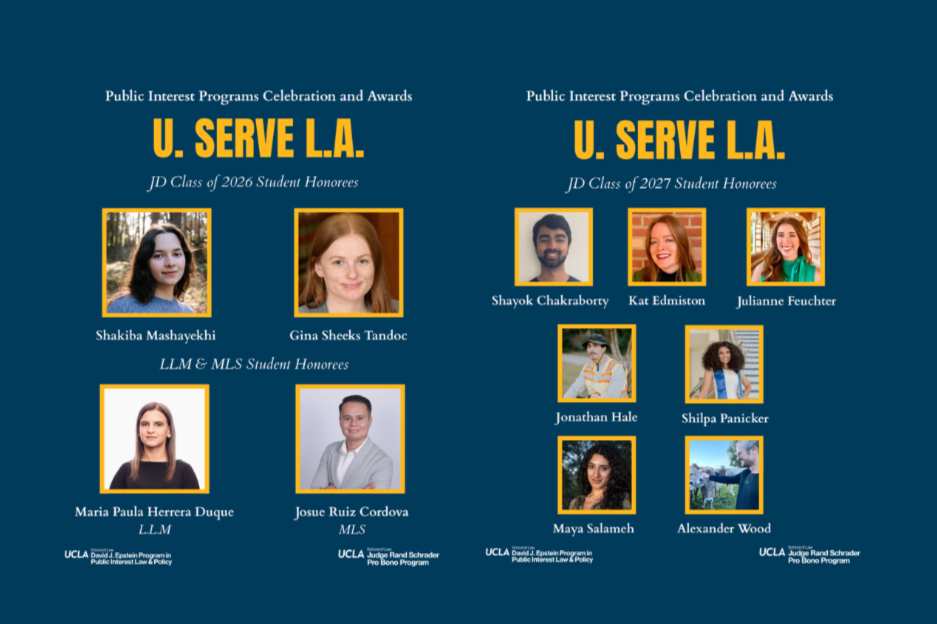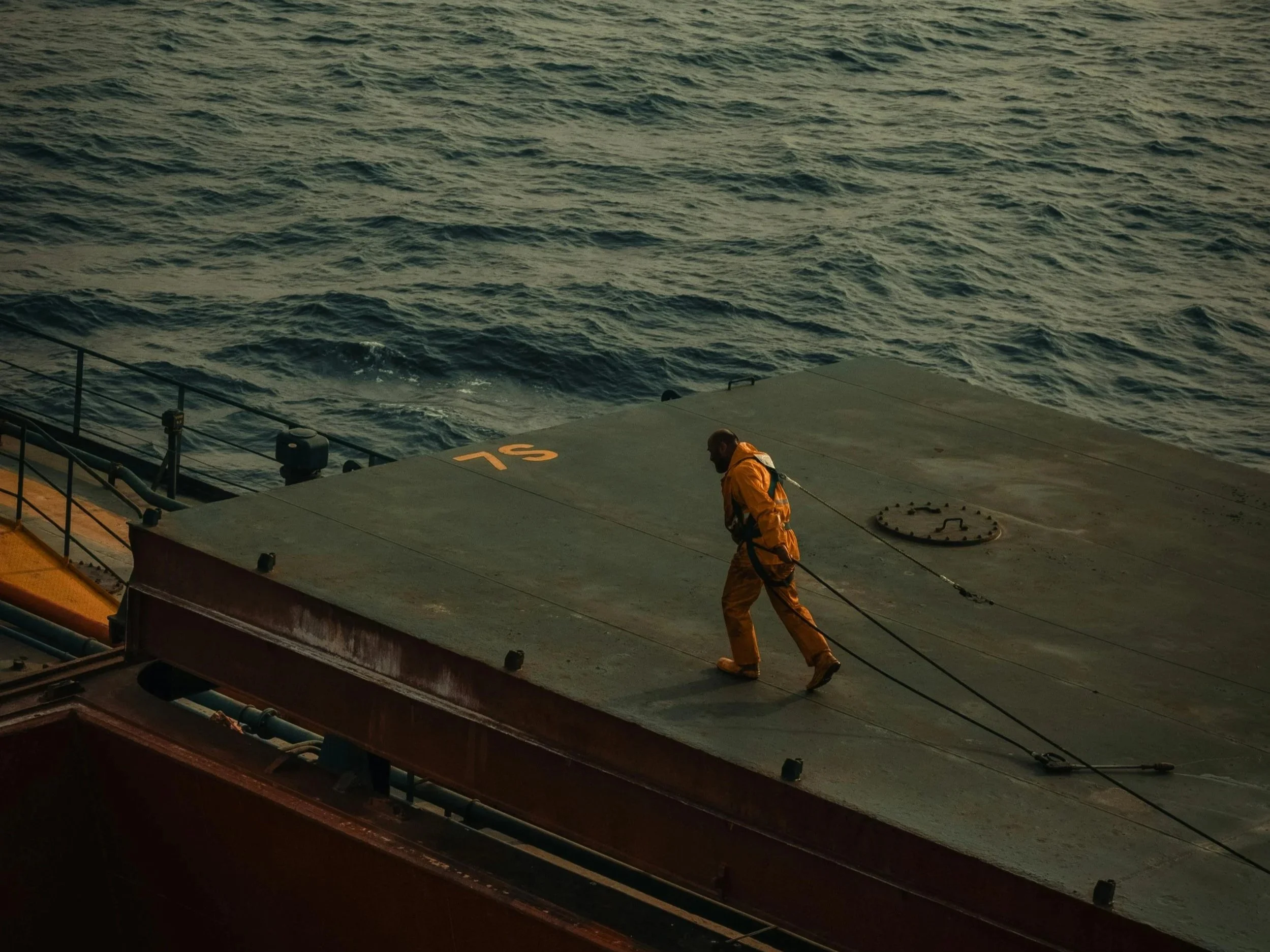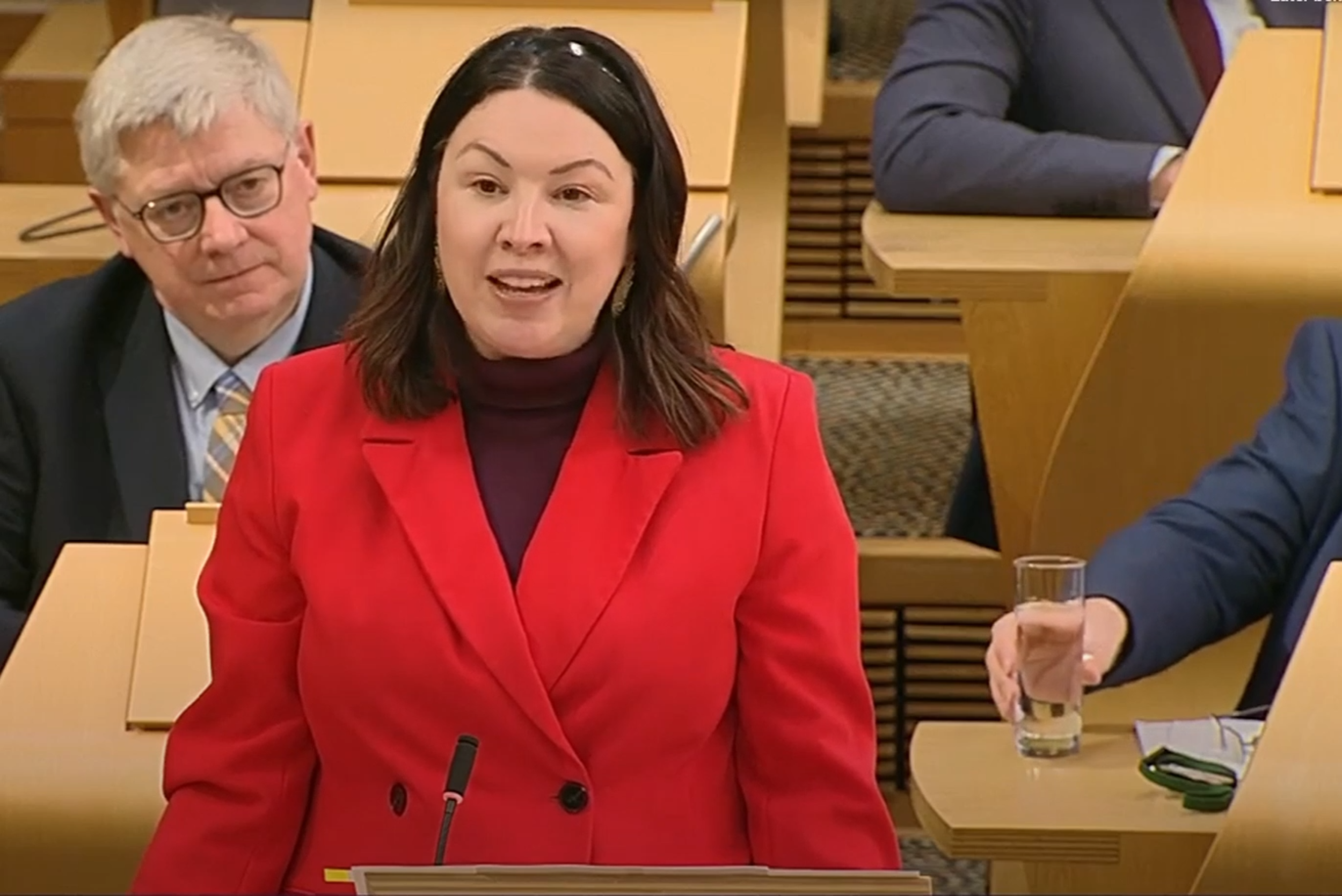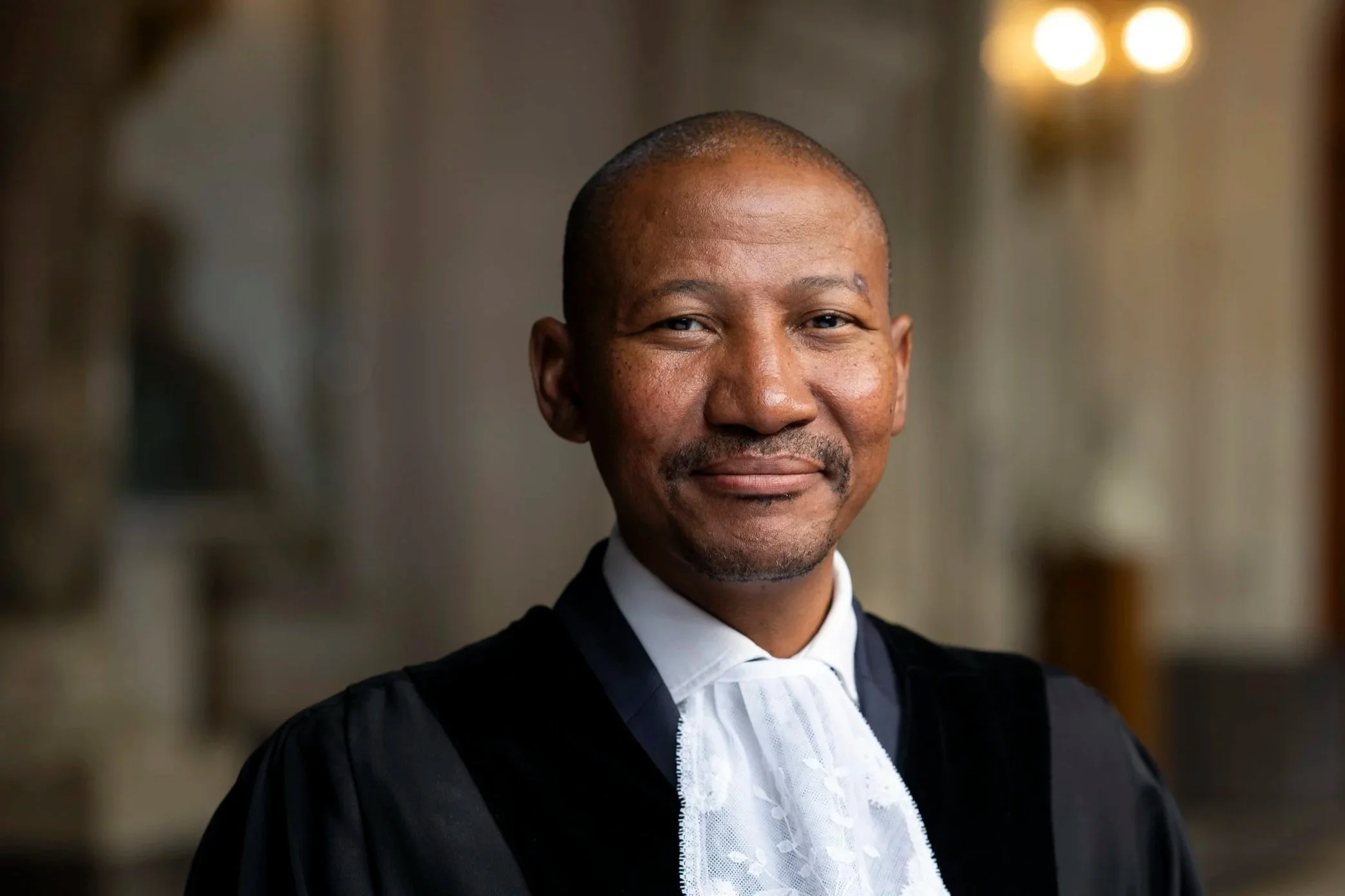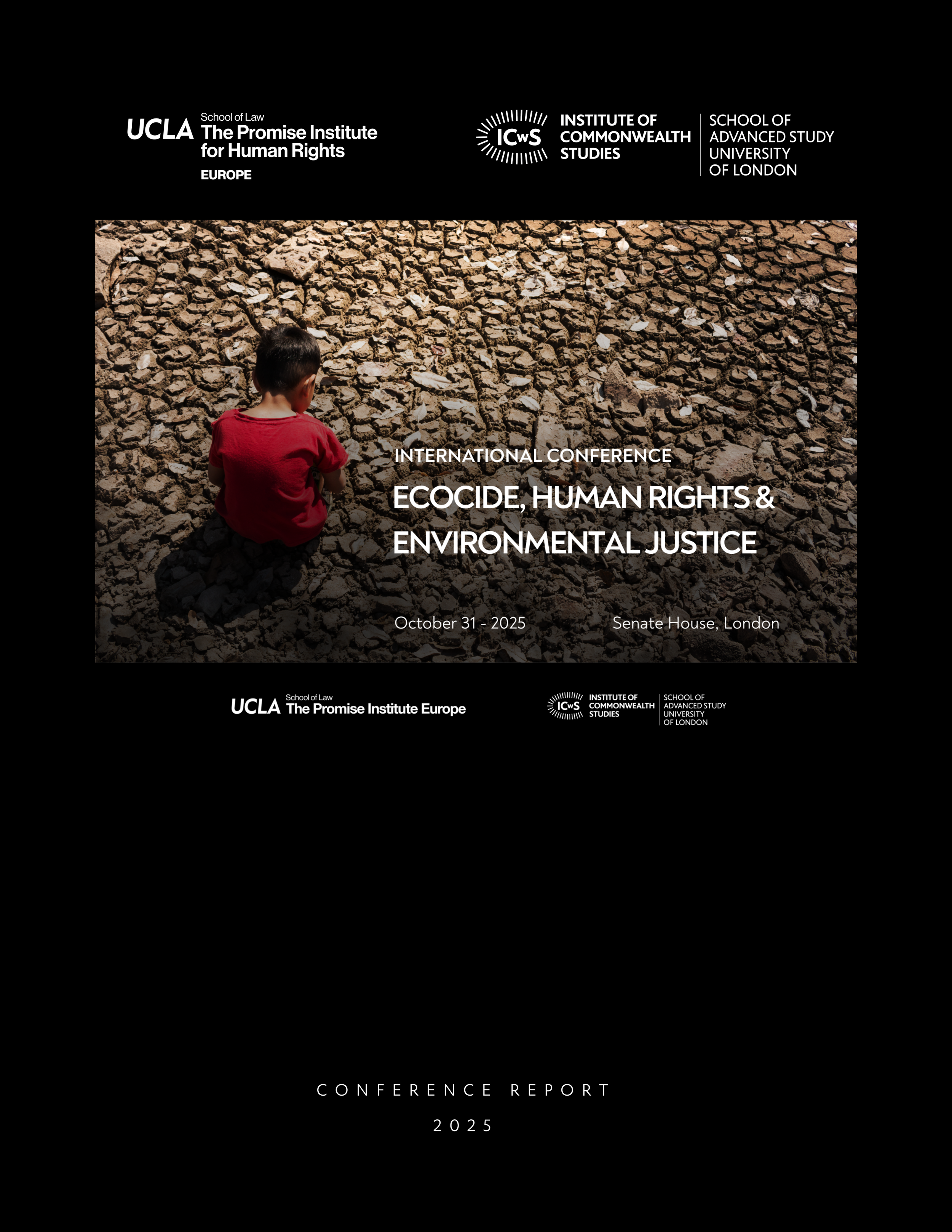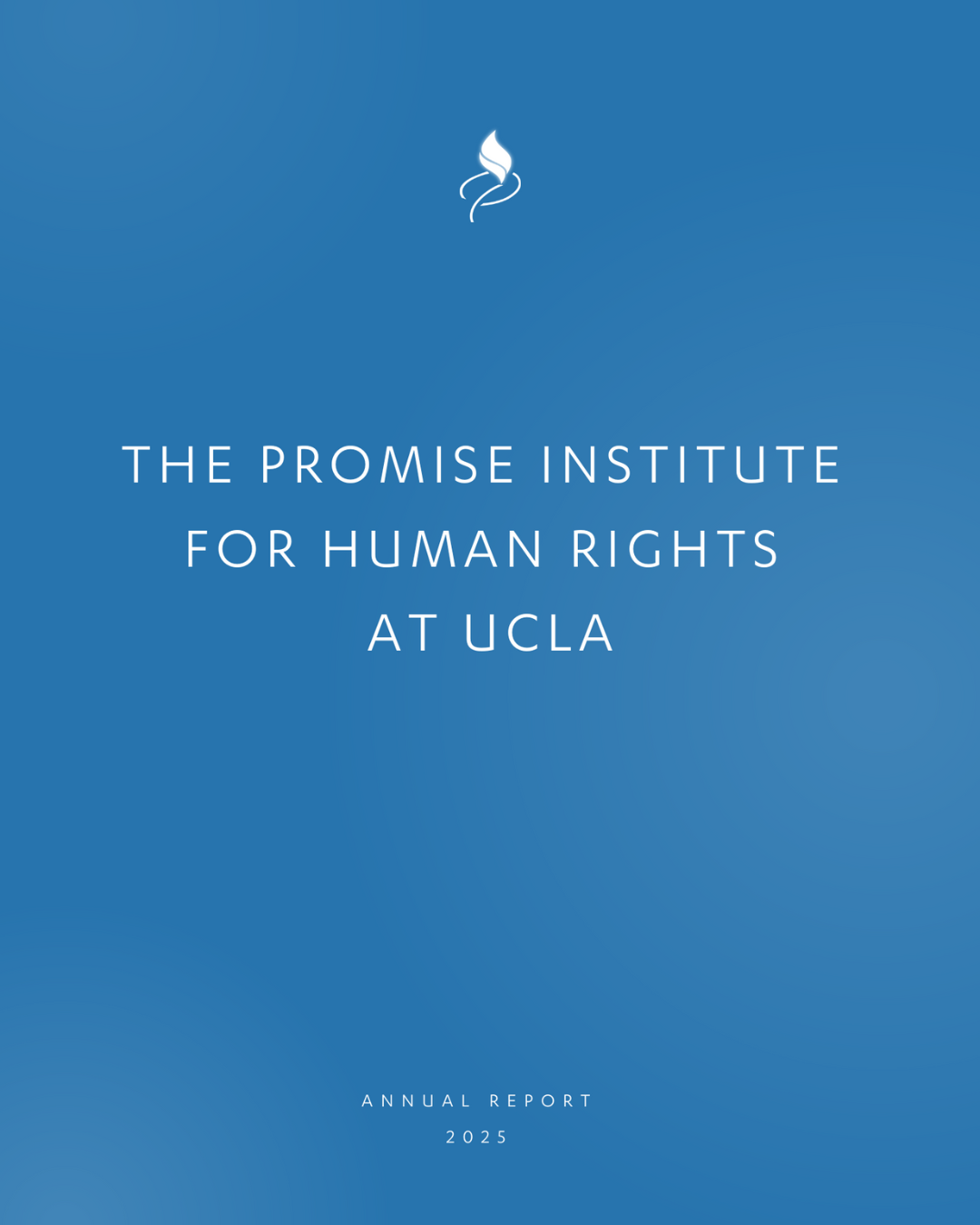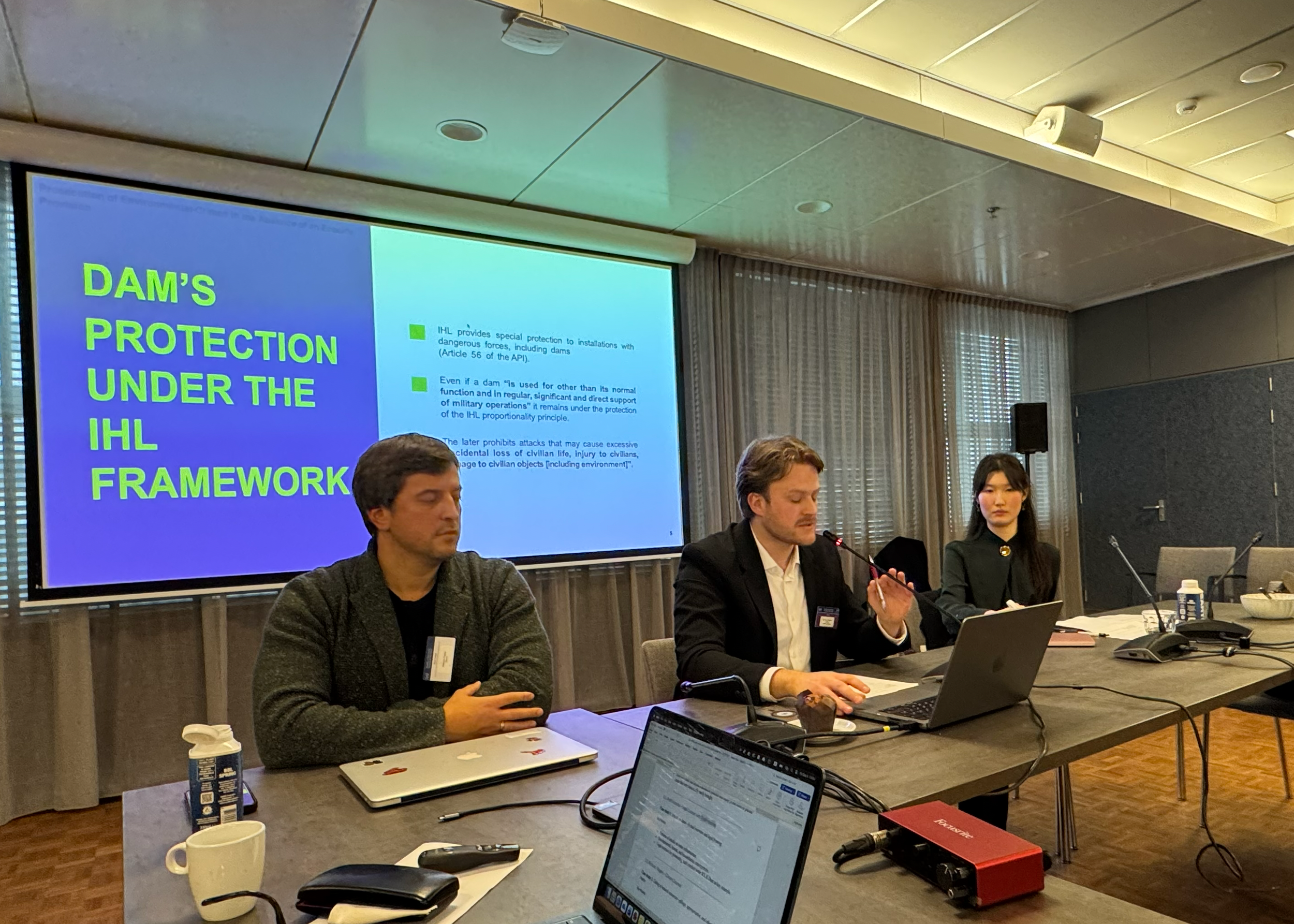The Promise Institute
for Human Rights (Europe) News

Our 2025 Annual Report
The Promise Institute for Human Rights at UCLA is pleased to present the 2025 Annual Report reflecting our work in both Los Angeles and Europe. We remain committed to uniting people around our shared mission to advance human rights and empower the next generations of lawyers, leaders, and advocates.
Our Pro Bono Student Honored with U Serve LA Award
Congratulations to our Pro Bono student, Maria Paula Herrera Duque, who has been named as this year's LLM recipient of the U Serve LA Award at UCLA School of Law!
Among her many public interest and pro bono contributions, Maria Paula has been working with us this year on a pro bono project conducting research and legal analysis with the UN Special Rapporteur on the Human Rights to Water and Sanitation.
Critical Race Theory and the Law of the Sea: Bringing CRT ‘Offshore
Our legal associate Amanda Danson Brown’s article “Critical Race Theory and the Law of the Sea: Bringing CRT ‘Offshore’” has been published in the peer-reviewed SOAS Journal of Postgraduate Research.
Amanda Brown observes that while critical scholars have increasingly encouraged bringing Critical Race Theory (CRT) approaches into international law, this expansion has largely stopped at the shoreline; the international law of the sea (ILOS) remains conspicuously absent from this global turn.
Scotland votes to advance the Ecocide Bill
We congratulate Monica Lennon, the Scottish Parliament, and the people of Scotland on the vote to advance the Ecocide (Scotland) Bill. This is a significant step towards recognising severe environmental destruction as a serious crime and future prevention of such crimes.
This vote marks an important moment for environmental justice and accountability. Scotland is demonstrating clear and principled leadership, both within Europe and globally.
Submission to OHCHR Regarding Nuclear Testing in the Marshall Islands as Existing and Potential International Crimes
Our Legal Associate, Xuchen Zhang, and ED, Kate Mackintosh, have submitted a brief to the Office of the High Commissioner for Human Rights in response to its Call for Input on addressing the challenges and barriers to the full realization of the human rights of the people of the Marshall Islands stemming from the State’s nuclear legacy.
Judging International Justice - Judge Dire Tladi Lecture in The Hague
Make sure to join us for a timely and reflective lecture by Dire Tladi, Judge of the International Court of Justice, for the second Judging International Justice Lecture series from The promise Institute for Human Rights at UCLA.
This lecture offers an opportunity to hear directly from a sitting international judge on the role, responsibilities, and limits of international adjudication today. Drawing on his experience as judge, scholar, and former government adviser, Judge Tladi will reflect on how international courts engage with complex global challenges, and how legal reasoning is shaped by institutional mandates, historical context, and evolving international realities.
Whoever Rules the Waves Rules the World: Sea Power and the Law of the Sea
We are pleased to share a newly published paper by Kal Raustiala, The Promise Institute Distinguished Professor of Comparative and International Law, 𝘞𝘩𝘰𝘦𝘷𝘦𝘳 𝘙𝘶𝘭𝘦𝘴 𝘵𝘩𝘦 𝘞𝘢𝘷𝘦𝘴 𝘙𝘶𝘭𝘦𝘴 𝘵𝘩𝘦 𝘞𝘰𝘳𝘭𝘥: 𝘚𝘦𝘢 𝘗𝘰𝘸𝘦𝘳 𝘢𝘯𝘥 𝘵𝘩𝘦 𝘓𝘢𝘸 𝘰𝘧 𝘵𝘩𝘦 𝘚𝘦𝘢, which is out in the American Journal of International Law this month.
Conference Report and Recordings are online!
Across three panels, Corporations and Colonialism; Accountability and Repair: Defining Justice for the Crime of Ecocide; and Human Rights and Environmental Stewardship, speakers explored ecocide through a human rights lens, offering a wide range of perspectives on how severe environmental harm intersects with human rights and how international law can be used to advance environmental justice. The programme concluded with an evening session focused on diplomacy and activism.
Enjoy dipping into the conference report, the recordings of the event, and the image gallery!
Support our Work!
From pro bono projects to the UCLA Law in The Hague externship programme, the Manual on the National Criminalization of Ecocide, and our international conference on Ecocide, Human Rights and Environmental Justice, these are just a few highlights of the past year.
Annual Report 2025
The Promise Institute for Human Rights at UCLA is pleased to present the 2025 Annual Report reflecting our work in both Los Angeles and Europe. We remain committed to uniting people around our shared mission to advance human rights and empower the next generations of lawyers, leaders, and advocates.
Last Class for UCLA Law in The Hague Students
The semester has officially come to an end for our UCLA Law in The Hague students.
It has been a full and inspiring period: internships at the International Court of Justice, the Kosovo Specialist Chambers, the International Development Law Organization, and the United Nations International Residual Mechanism for Criminal Tribunals, a study visit to Geneva to watch the UN in action and meet with human rights practitioners, and participation in a major conference in London on ecocide, human rights and environmental justice.
Prosecuting Environmental War Crimes: Lessons Learned from Ukraine
At the Assembly of States Parties to the International Criminal Court (ASP24), experts from Ukraine and international legal organisations outlined how environmental harm is being investigated and framed in active conflict, offering insights that are shaping approaches in other jurisdictions. The session included a preview of a new manual on prosecuting international environmental crimes.
OTP Policy on Addressing Environmental Damage through the Rome Statute launched
The OTP Policy on Addressing Environmental Damage through the Rome Statute has been launched this Thursday at the Assembly of States Parties to the International Criminal Court in The Hague.
This document is the outcome of an extensive global consultation on how international criminal law can better respond to severe environmental harm (an area where accountability is widely recognised as urgent).
Prosecuting Environmental War Crimes: Lessons Learned from Ukraine
H𝘰𝘸 𝘤𝘢𝘯 𝘦𝘯𝘷𝘪𝘳𝘰𝘯𝘮𝘦𝘯𝘵𝘢𝘭 𝘥𝘦𝘷𝘢𝘴𝘵𝘢𝘵𝘪𝘰𝘯 𝘣𝘦 𝘪𝘯𝘷𝘦𝘴𝘵𝘪𝘨𝘢𝘵𝘦𝘥, 𝘥𝘰𝘤𝘶𝘮𝘦𝘯𝘵𝘦𝘥, 𝘢𝘯𝘥 𝘱𝘳𝘰𝘴𝘦𝘤𝘶𝘵𝘦𝘥 𝘢𝘴 𝘢𝘯 𝘪𝘯𝘵𝘦𝘳𝘯𝘢𝘵𝘪𝘰𝘯𝘢𝘭 𝘤𝘳𝘪𝘮𝘦?
𝘞𝘩𝘢𝘵 𝘤𝘢𝘯 𝘵𝘩𝘦 𝘪𝘯𝘵𝘦𝘳𝘯𝘢𝘵𝘪𝘰𝘯𝘢𝘭 𝘤𝘰𝘮𝘮𝘶𝘯𝘪𝘵𝘺 𝘭𝘦𝘢𝘳𝘯 𝘧𝘳𝘰𝘮 𝘜𝘬𝘳𝘢𝘪𝘯𝘦'𝘴 𝘶𝘯𝘱𝘳𝘦𝘤𝘦𝘥𝘦𝘯𝘵𝘦𝘥 𝘦𝘧𝘧𝘰𝘳𝘵𝘴 𝘵𝘰 𝘣𝘳𝘪𝘯𝘨 𝘦𝘯𝘷𝘪𝘳𝘰𝘯𝘮𝘦𝘯𝘵𝘢𝘭 𝘸𝘢𝘳 𝘤𝘳𝘪𝘮𝘦𝘴 𝘵𝘰 𝘫𝘶𝘴𝘵𝘪𝘤𝘦?
The groundbreaking Environmental War Crimes Guide for Ukrainian prosecutors [climatecounsel.org/warcrimes] is being transformed into a global 𝐌𝐚𝐧𝐮𝐚𝐥 𝐟𝐨𝐫 𝐭𝐡𝐞 𝐏𝐫𝐨𝐬𝐞𝐜𝐮𝐭𝐢𝐨𝐧 𝐨𝐟 𝐈𝐧𝐭𝐞𝐫𝐧𝐚𝐭𝐢𝐨𝐧𝐚𝐥 𝐄𝐧𝐯𝐢𝐫𝐨𝐧𝐦𝐞𝐧𝐭𝐚𝐥 𝐂𝐫𝐢𝐦𝐞𝐬 for application both in conflict and beyond.
Back to Business: Criminalizing Ecocide would shift the burden from Victim to Corporate Decision Makers
The criminalisation of ecocide is coming, both domestically and internationally. The real question for us, especially in the business and human rights community, is: what difference will it make? How will the emergence of ecocide as a crime strengthen and complement businesses’ obligations to conduct human rights and environmental due diligence?
Watch Kate Mackintosh reflect on this question at the UN Business and Human Rights Forum, Geneva, 24 November 2025
Samia Dumbuya: Making Green Skills Accessible
Inspiring words from London based climate educator and founder of The Peoples Ark, Samia Dumbuya, at our International Conference on Ecocide, Human Rights and Environmental Justice.
Samia is working to achieve people powered climate action and inclusive decision making so communities can shape just climate futures.
Dr Farah Faizal: “Climate Change has been a Lived Reality for Maldivians for four Decades!”
Dr Farah Faizal, former Maldivian diplomat, opened the panel Human Rights and Environmental Stewardship at our recent conference on Ecocide, Human Rights and Environmental Justice, with a call to action, a reminder that talk alone is not enough and that practical work must follow.
Conference Highlights: Baroness Rosie Boycott
Baroness Rosie Boycott opened the conference with a thoughtful keynote address.
She reflected on themes that would reappear throughout the day, beginning with the contrast between her own childhood memories of time spent in nature and what her grandchildren now experience. Noting how dramatically these everyday landscapes have changed, she highlighted the importance of recognising that people’s sense of “normal” shifts as the environment deteriorates.
Why is the Environmental Cost of War not on the Agenda at COP 30?
Kate Mackintosh, our ED and vice chair of the independent expert panel for the legal definition of ecocide answers the questions:
Why is the environmental cost of war not on the agenda at COP 30 and could an international crime of ecocide change accountability?
How wars ravage the environment - and what International Law is doing about it
People across the Gaza Strip have been returning to towns and cities badly damaged by the war after a fragile ceasefire took effect in October. Eventually, their lives will be restored and their homes will be built back. But the climate consequences of the war will remain for years to come.
Panel 3: Human Rights and Environmental Stewardship
The third panel of the day, Human Rights and Environmental Stewardship, chaired by Dr. Farah Faizal, former High Commissioner of the Maldives, examined how efforts to protect nature intersect with human rights, culture, and inequality.
Lovleen Bhullar spoke about India’s polluted rivers, noting that long before environmental law, local communities had their own systems of stewardship and protection. Dr. Matthew Gillett and Darryl Robinson debated the balance between anthropocentric and ecocentric perspectives, while Daniel Adjin Odonkor brought the discussion to life with the example of small-scale gold mining in Ghana.


